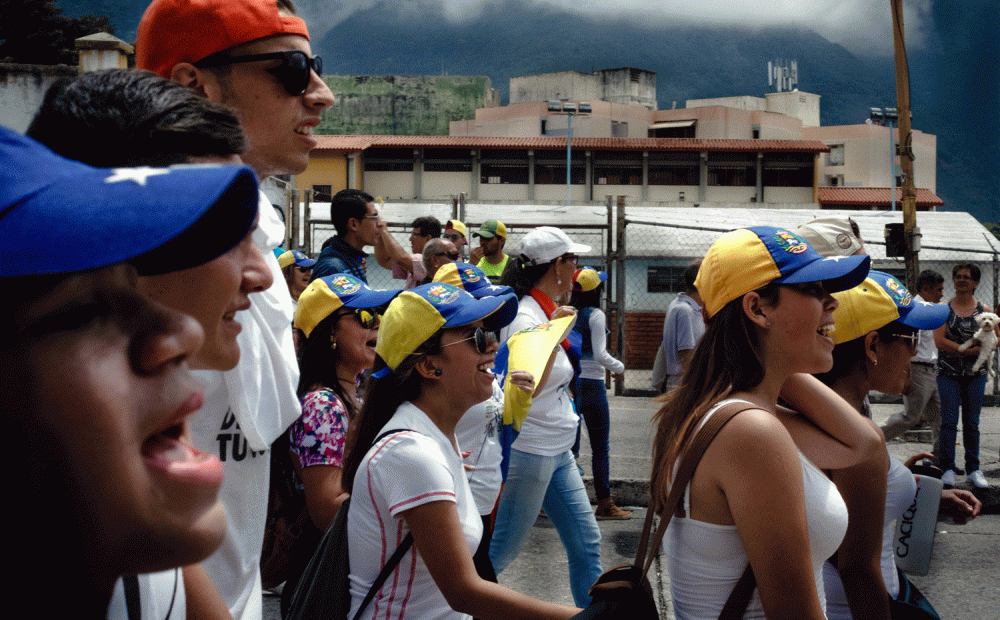Venezuela in Crisis: Policy Options and Prognoses

The deepening political and economic crisis in Venezuela has shaken the Western Hemisphere. While the embattled government of President Nicolás Maduro has faced condemnation and pressure – including through the country’s suspension from MERCOSUR and several rounds of U.S. sanctions – it continues to cling to power. Meanwhile, the Constituent Assembly, considered illegitimate by the international community, has announced that it will seek to prosecute opposition leaders for treason.
What are the policy options for the international community at this point? Are further sanctions an effective way to foment change, or would they add to the suffering of the Venezuelan people? What are the chances of China or Russia coming to the aid of the Maduro government? As the immediate and long-term political future of Venezuela hangs in the balance, Washington and the world must calibrate their strategy carefully.
Listen to four veteran analysts as they discuss what’s ahead for a nation on the brink and the international community’s next moves.
Key Quotes
Eric Olson
“The Venezuelan economy and political landscape continue to spiral out of control, leaving a humanitarian crisis in [their] wake and posing a major risk to the region.”
Michael Penfold
“On the economic front, I have to say that Venezuela has already adapted to sanctions. Venezuela has lost over a third of its GDP, the country is in the middle of inflation rates that are over 700 percent a year, and there is hardly any new investment coming in.”
“How has society reacted to sanctions announcements? According to several different opinion polls, 55 percent of Venezuelans actually reject the idea of using this type of sanctions against the country; but 65 percent of the population does not blame the opposition [for the sanctions] either. So, in many ways, the government has had a difficult time transferring the blame to the opposition by arguing they are working on behalf of the U.S. government.”
Risa Grais-Targow
“While the impact of the most recent round of sanctions on the oil sector overall is fairly limited, it’s my expectation that the Trump administration is going to continue to ratchet up pressure. Sanctions targeting the oil sector are still very much on the table.”
“President Trump has been presented with a road map of escalatory sanctions that will be imposed in response to events on the ground. Potential triggers for additional actions are anything that is a gross violation of democratic norms or an uptick in violence against civilians.”
Francisco Rodríguez
“Venezuela is right now undergoing the largest economic contraction since its independence. It is also undergoing the largest economic contraction in Latin American economic history.”
“When I get the question [of] when will Venezuela’s economy collapse, by any standard, what has happened right now is a collapse. We are definitely seeing a decline in living standards which has surpassed any level of normal decline.”
R. Evan Ellis
“In responding to Venezuela’s current crisis, China and Russia have not only commercial interest in Venezuela, but also have strategic interest in the survival of what I would term a solvent anti-U.S. regime, which may or may not include Nicolás Maduro.”
“I believe the response to sanctions will be that China and Russia will both work to support the regime and steer the transition to their benefit with respect to whatever leadership change there may be. It’s increasingly China [that] holds the keys to the future of the regime and only secondarily, Russia.”
Speakers


Professor of Political Science, Instituto de Estudios Superiores de Administración (IESA) Business and Public Policy School, Venezuela
Moderator

Director of Policy and Strategic Initiatives, Seattle International Foundation
Hosted By

Latin America Program
The Wilson Center’s prestigious Latin America Program provides non-partisan expertise to a broad community of decision makers in the United States and Latin America on critical policy issues facing the Hemisphere. The Program provides insightful and actionable research for policymakers, private sector leaders, journalists, and public intellectuals in the United States and Latin America. To bridge the gap between scholarship and policy action, it fosters new inquiry, sponsors high-level public and private meetings among multiple stakeholders, and explores policy options to improve outcomes for citizens throughout the Americas. Drawing on the Wilson Center’s strength as the nation’s key non-partisan policy forum, the Program serves as a trusted source of analysis and a vital point of contact between the worlds of scholarship and action. Read more
